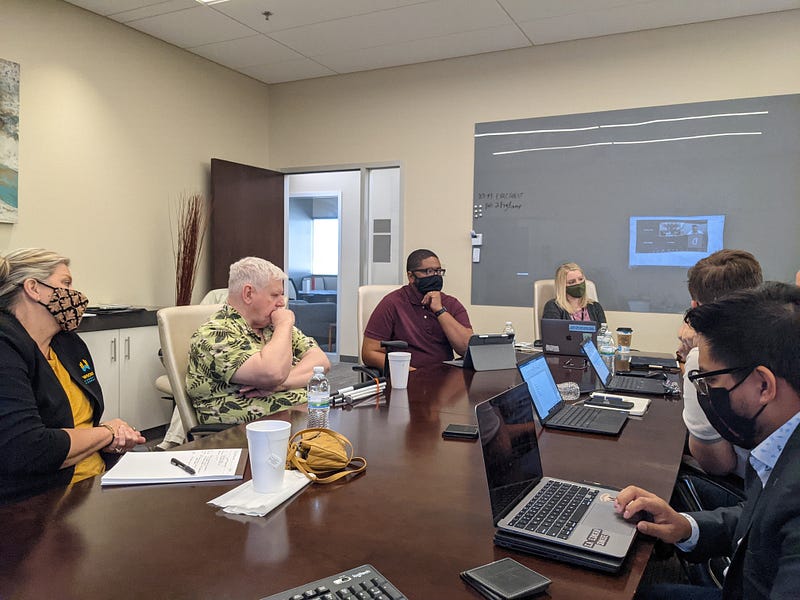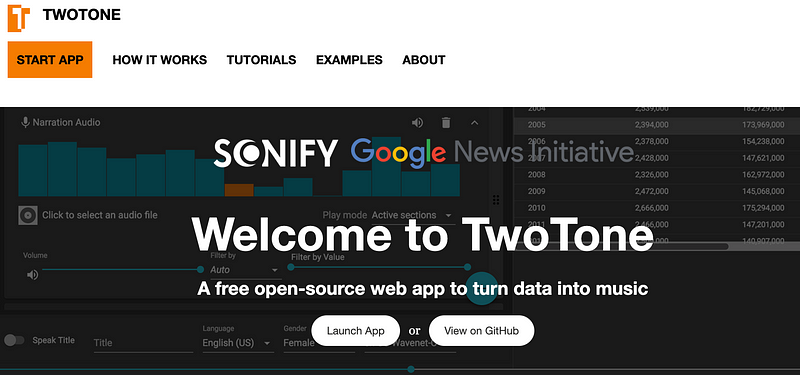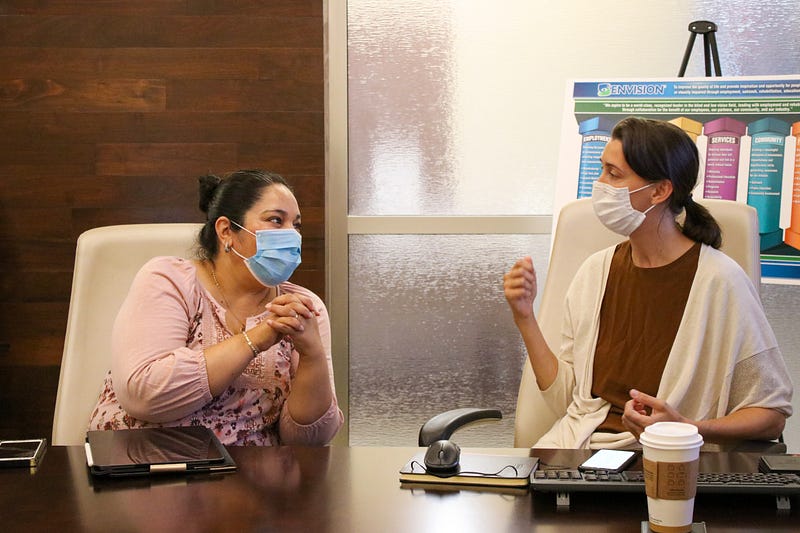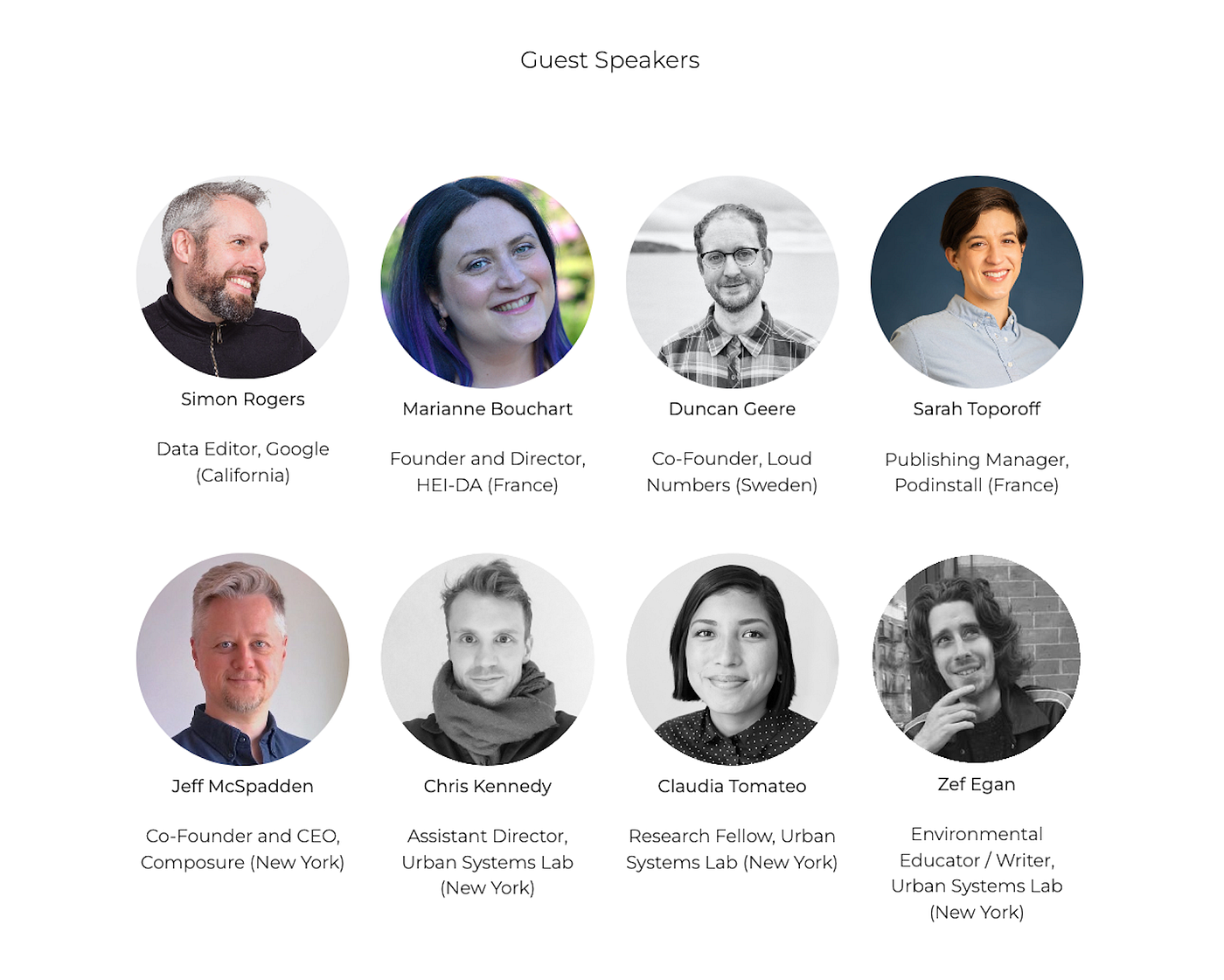
Data-Driven Storytelling: Making Civic Data Accessible with Audio
The summary below includes audio embeds that are an integral element of the story. In assessing the impact of the project, the process is as important to us as the final productions. The podcasts from each of the teams demonstrate how far they’ve come technically but the proficiency of these pieces hides the many risks taken and lessons learned along the way. The short clips of participants, created from project discussions and workshops, help us ‘paint a picture’ of the creative process by giving voice to personal journeys and perspectives.
Data-Driven Storytelling: Making Civic Data Accessible with Audio, a collaboration between Sonify, the Wichita Community Foundation and Envision Research Institute, was a year-long initiative based in Wichita Kansas that empowered newsrooms to create data-driven sonification podcast stories working with advisors from the blind and visually impaired community throughout all stages of the ideation and production process. The goal was to test new approaches for communicating data with sound; through audio production, listening sessions, hands-on workshops and applied research. The project was one of seven national winners of the Knight Foundation’s “Data For Civic Engagement” award.
“The potential of data to bring residents together and solve problems is immense: data can help us better understand and improve the communities we live in, serve as a spark for civic dialogue and conversation, and enable us to hold governments and other institutions accountable. These data, like the community newspapers of John S. and James L. Knight’s era, are the common set of facts about a community. Taking advantage of data requires that residents make use of and put data to work in the service of the community.”
Knight Foundation, Data for Civic Engagement
link to source


In our original response to the Knight Foundation’s open call for ideas we stressed that while it was true that Open Data offered an opportunity to reshape communities through civic engagement, the exclusively visual format of this material was unnecessarily limiting and could exclude residents from the blind and visually impaired community, seniors and other groups. By concentrating on a collaborative approach to audio storytelling with data, we aimed to identify best practices and construct an informed point of view that could be used to guide digital inclusion efforts in the development of future technology, design and policy. If the enormous challenge of making city and government civic data portals accessible was outside of the scope of our effort, we could at least try to make a meaningful contribution by bringing people together to imagine what an audio based solution could sound like.

Participants working at a conference table during an in-person training session.
Sonification
“Sonification is the use of non-speech audio to convey information or perceptualize data. Auditory perception has advantages in temporal, spatial, amplitude, and frequency resolution that open possibilities as an alternative or complement to visualization techniques.”
Wikipedia

Get the TwoTone data sonification web app for free here — https://twotone.io/
Our team at Sonify innovates at the intersection of audio, data and emerging technologies; providing training, production and R&D&I services to design and develop audio-first solutions for human-computer interaction. Sonify’s technology projects include TwoTone, a free and open source web app supported by Google News Initiative that allows users to sonify a dataset without writing a single line of code. TwoTone was built to provide a fun and intuitive way for people to make their own compositions, without any prior musical or technical knowledge. The TwoTone app was launched in 2019 (before we started this project) and was not designed to enable authoring of sonifications by users who are blind and visually impaired (we’re working on fixing that). Therefore our newsroom teams created sonifications for their podcast projects using TwoTone and worked with their assigned BVI advisors to ensure that the output could be both accessible and comprehensible. It’s important to stress that our goal was not to build solutions specifically designed for the BVI community but instead to utilize the unique perspectives and insights of this community to help us better understand how to create audio-first solutions that could work for everyone.
“Some might be inclined to dismiss sonification as a novelty, but a new generation of screenless devices with voice interfaces, such as Amazon’s Alexa, marks the end of silent interaction with computers. It is perhaps naive to think that data will continue to just be seen and not heard.”
Alan Smith, Financial Times
link to source

Ron Schuchard PhD, FARVO, Executive Director, Envision Research Institute
Why Wichita?
In Wichita we found visionary organizations with forward-thinking approaches to new technologies and methodologies. They were open to experimentation and allowed us to tap into their pre-existing networks to find participants in both the hyperlocal news and the blind and visually impaired communities. Envision Research Institute started as a small vocational workshop in Wichita in 1933 and is now one of the most trusted resources for people who are blind or visually impaired, as well as for the professionals and caretakers who serve them. And the Wichita Community Foundation, founded in 1986, strives to create a more informed city by strengthening Wichita’s local news ecosystem and has committed at least three years of staff time and additional resources to this cause.
Courtney Bengtson, Director of Strategic Initiatives, Wichita Community Foundation
Newsroom Teams
Wichita Community Foundation was already making efforts to establish a journalism collaborative as part of their strategy for supporting local news. They helped us to identify our participating newsroom teams — The Journal, Planeta Venus and Wichita Public Library.
The Journal is a nationally recognized magazine. The publication focuses on highlighting important civic leadership issues in Kansas and beyond through in-depth reporting, investigative journalism and innovative writing, graphic design, photography, multimedia and public discussions. The Journal is nonpartisan. It seeks to educate and inform readers about issues from multiple perspectives and it does not engage in advocacy. The Journal is published by the Kansas Leadership Center, which receives core funding from the Kansas Health Foundation. The print edition of the magazine is distributed quarterly to more than 8,000 across Kansas and beyond.
Chris Green, Managing Editor, The Journal
Planeta Venus — Planeta Venus is hosted by Claudia A. Amaro. Claudia is a native from Tijuana Mexico. She has lived in Wichita Kansas for many years and she is passionate about communications and the Hispanic community. She has spent the last few years researching on different topics relevant to the Hispanic community in the midwest (U.S.) and making sure effective communication happens despite the difference in language and culture. She is the owner of AB&C Bilingual Resources, LLC a Bilingual Marketing Consulting Firm and the creator of Planetavenus.online a Spanish online Radio Station that features music and podcasts in Spanish. She has been able to inform and engage the Hispanic community in Wichita by building trust and delivering local community information in Spanish through her social media channels. This was especially relevant during COVID-19.
Claudia Amaro, Host, Planeta Venus
Wichita Public Library — The Wichita Public Library is the local public library system in Wichita, Kansas. It consists of a central library located downtown and six branch locations distributed throughout the city. The Wichita Public Library offers resources including reference in person, by telephone, mail and e-mail. Many electronic resources are offered from the library’s website and can be used by customers from home with a Library card. The library offers a wide range of programs free of charge and open to the public. The library’s summer reading programs for youth reach more than 10,000 children annually. Annually, the library offers a reading program for adults. Each fall since 2008, the Library has hosted “The Big Read Wichita”, a series of programs built around one book title.
Janelle Mercer, Technology Trainer Librarian, Wichita Public Library
Blind and visually Impaired (BVI) Advisors
Envision Research Institute recruited 15 advisors from the BVI community to mentor our newsroom teams throughout the project. On their advice, the advisors were selected from the ‘blindness’ end of the visual impairment spectrum that represents less than 10% of BVI individuals. The idea was that if we could create data-driven audio stories that were accessible and appealing to this group, we could learn how to make stories that were better for everyone. Working with this group we quickly learned that blindness is not the same for everyone — a group of blind people is still a group of individuals with unique perspectives. Our BVI Advisory Group consisted of 9 Male and 6 Female, located in four US states (Kansas, Wisconsin, Ohio and North Carolina), and included accessibility scientists and advocates, technologists and engineers, educators and lawyers.
BVI Advisors:
Rakesh Babu, David Ballmann, Kellie Gerdts, Shannon Gerdts, Terese Goren, Kimberly Kiser, Dan Lococo, Alosha Moore, Mika Pyyhkala, John Samuel, Emily Schlenker, Karl Smith, Susie Stanzel, Robert Tabor, Sandra Wilkinson.
Robert Tabor, BVI Advisor
The Process
Our process involved three production periods and two intensive hands-on training programs. We adopted a rapid prototyping method for production and testing. Each newsroom worked on their data-driven stories and received detailed feedback at sessions each month from their BVI advisors. This provided insights around how best to use data with sound but it quickly moved beyond this into a two-way communication that helped our newsroom teams to become better storytellers by embracing new perspectives as well as new techniques.

Claudia Amaro (Planeta Venus) and Debra McGrory (Sonify) working at an in-person training session in Envision, Wichita Kansas, September 2021.
The process facilitated a lot of room for experimentation and growth on both professional and personal fronts for all involved. The ability to make mistakes in a safe and supportive environment led to a feeling among the newsrooms that the advisors and instructors were an extension of their production teams and this empowered them to take risks. From our three newsrooms, only one had previously made audio stories and only one of our BVI advisors had previously heard of data sonification. Over the course of the year each newsroom started to make podcasts, which is an especially big departure for a local library and a print magazine.
Training
Our process involved three production periods and two intensive hands-on training programs. The first training program was delivered in three virtual sessions by the Sonify team in January 2021. Participating newsrooms received guided walkthroughs of Open Data portals and hands-on demonstrations of building sonifications with TwoTone, including advanced features for filtering and narration. Then in September 2021 we ran a four day in-person intensive training program for newsrooms and BVI advisors (hosted at Envision Research Institute headquarters in Wichita Kansas) with guest speakers from Sweden, France, and both coasts of the United States.
Guest Speakers:
Simon Rogers, Data Editor, Google (California), Marianne Bouchart, Founder and Director, HEI-DA (France), Duncan Geere, Co-Founder, Loud Numbers (Sweden), Sarah Toporoff, Publishing Manager, Podinstall (France), Jeff McSpadden, Co-Founder and CEO, Composure (New York), Christopher Kennedy, Assistant Director, Urban Systems Lab (New York), Claudia Tomateo, Research Fellow, Urban Systems Lab (New York), Zef Egan, Environmental Educator / Writer, Urban Systems Lab (New York).

The Podcasts
The three podcasts cover a broad range of themes to tell local stories with universal appeal; from the appropriate pronunciation of the name of a local Army chaplain and decorated war hero who could one day become one of the Catholic Church’s few American saints, to the demographic and immigration factors associated with depression symptoms among immigrants, and the impact of COVID-19 on attendance at the library’s Summer Reading Programs.
Learnings
Our learnings from this project can be summed up in three key areas:
- Inclusion + Development (Perspective)
We learned that including a broad range of perspectives in the development of technologies or stories can have a transformative impact and that the best place to do this is at the outset. It is better (and considerably less expensive) to avoid problems rather than try to fix them later. This was echoed by our BVI participants who seemed pleasantly surprised in the early stages of the project that their thoughts were being listened to and acted upon.
When we started this project we assumed that our conversations with BVI Advisors would be limited to discussions around accessibility. We were a bit nervous and didn’t know if this community would be welcoming or suspicious of what we were trying to do. What we found was a group of committed individuals who thought seriously about the challenges being presented and helped the newsrooms and mentors think differently about storytelling and technology in general. We found a community of hackers, who have had to build some kind of workaround for everything they’ve been given since they’ve rarely if ever been included in the development of technology solutions designed ‘for’ rather than ‘with’ them.
Emily Schlenker, BVI Advisor
2. Accessibility + Usability (Standardization)
We learned the difference between accessibility and usability. For example, having access to thousands of badly labeled spreadsheets in an Open Data platform is not particularly useful. Standardization of the data itself, the navigation system and the final presentation (in visuals or audio), could aid considerably in the creation of a usable communication platform.
When our BVI advisors tested Open Data platforms they reported a lack of standardization not just between different cities but also within individual city portals in regards to how data was categorized. Also some platforms display their data on interactive maps which are not accessible. The publishers of Open Data platforms are already aware of the lack of standardization but we hope that framing the discussion from the perspective of accessibility can help to make the issue a priority.
Dan Lococo, BVI Advisor
3. Sonification + Voice (Understanding)
Sonification is traditionally defined as ‘non-speech’ audio. And the world of voice assistants mostly excludes music and other sounds. But this project demonstrated to us that the combination of data sonification with voice can help the listener with understanding. The podcaster’s voice provides the necessary context required for the data and helps to make the content more memorable and engaging.
The idea of combining sonification with narration may seem obvious but it is not the usual method for how data sonification is presented. When our BVI advisors access data in a spreadsheet they use a screen reader. This is a linear process. The screen reader reads out one column of data at a time. Sonification offers the potential to use musical notes or other sounds to represent data from other columns in addition to the voice so that the listener can be given a quick overview or summary of the information.
Sandra Wilkinson, BVI Advisor
What’s Next?
We are updating our TwoTone data sonification tool with additional support from Google News Initiative. We are working with renowned electronic musician, composer and producer Cristian Vogel as our interim Chief Technology Officer on the redesign project to add new features to the free. and open source web app.
We have 68 hours of recorded audio from this project, including all training sessions and conversations between newsrooms and BVI advisors, which can be used as a resource for future research projects. This audio is searchable using Pinpoint, a research tool from Google’s Journalist Studio for exploring and analyzing large collections of documents or media.
Rakesh Babu, BVI Advisor
Connect with us
Please connect if you’re interested in finding out more.
Project Website — https://www.wichita.sonify.io/
Sonify Website — https://sonify.io
TwoTone Web App — https://twotone.io/
Twitter — @sonifydata